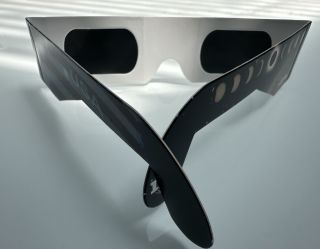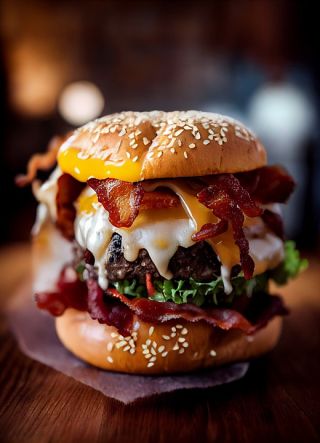Defense Mechanisms
Defense Mechanisms Are the Sunglasses of Our Mind
While they can be protective, defense mechanisms can be detrimental if overused.
Updated May 29, 2024 Reviewed by Davia Sills
Key points
- Defense mechanisms, like sunglasses, filter out varying levels of truth and light.
- Defense mechanisms can serve a positive, protective purpose but become problematic if overused.
- Even when used constructively, remember that defense mechanisms tend to provide a distorted perspective.
Earlier this spring, many of us had the privilege to see the solar eclipse while at the same time learn a lesson about defense mechanisms. For those of us who cared about preserving our vision, we were advised to wear a pair of special eclipse sunglasses designed to block out 99.999 percent of the sun's visible light, as well as its infrared and ultraviolet light. When I put the glasses on, I was able to see the sun and moon clearly, but that's all I was able to see. This is similar to how defense mechanisms work.

The eclipse glasses prevented me from seeing everything else besides the sun. This was the price I had to pay for protecting my eyes. I couldn't see the trees, the blue sky, or the birds chirping overhead. But I did see the moon covering about 98 percent of the sun, which was still pretty cool.
Not all sunglasses are as limiting as the eclipse glasses. In fact, most sunglasses are predominantly transparent (if they weren't, we wouldn't be able to drive or play sports with them on), but all of them filter out part of the sun's natural light while tinting the surrounding landscape in a particular color. We've all heard about the person who "goes through life with rose-colored glasses." This is a metaphor for someone using denial as a defense mechanism to block out anything threatening or problematic about the world that would bring down their mood.
Our defense mechanisms, like our sunglasses, serve as filters, enabling us to absorb varying amounts of the truth and light while protecting us from the serious harm that may come from overexposure to these forces. But we can't forget that they also distort reality in a way that limits our access to truth (as well as Plato's Truth), including truth about ourselves and truth about the world. The grass is not pink, even though it appears that way when seen through rose-colored glasses. Similarly, we are not as good as we think we are, nor are our enemies as bad as our defense mechanisms would lead us to believe. Whatever we look at with our defense-tinted sunglasses, we need to re-examine without these glasses in order to assess them more honestly.
What Defense Mechanisms Protect Us From
Think, for a moment, about the most impactful death you experienced in your life—A grandparent? A parent? A friend? Reflect on how that one death had a ripple effect across so many other people's lives, significantly altering them in profound ways long after that person died.
Now, consider the fact that more than 150,000 people die every day! And more than 1,000 of these daily deaths are the result of homicide. That's a lot of death and pain happening all around you on a daily basis—and we haven't even discussed the casualties of wars. How much of that death and pain do you allow into your conscious awareness?
Maybe you're the type of person who feels more of a bond with animals than people: your dog, your cat, your chinchilla? Perhaps you're even someone like me who can't bring himself to kill a mere ant (I usually trap them with a cup and take them outside). Now consider that each day, the number of animals killed for food alone is close to one billion!

If ever you should have the misfortune of going on a date with a vegan and ordering a hamburger, you're likely to get an earful about the cruelty cows endure in the slaughterhouse, ruining your meal and your date. For this reason, most of the hamburger-loving world is likely to avoid dining with vegans. I dated a vegan once in graduate school, and let me tell you, our dates were a chore!
Did I dump her?
No, I married her, but that's a whole other story. The point is, those of us who eat meat are only able to do so because our defense mechanisms block us from thinking about the suffering and killing of the animals we consume... that is, until some plucky vegan punctures those defense mechanisms, leaving us no other moral option except to become vegetarians ourselves and marry them in a vegetarian wedding, but again, that's a whole other story.
Regardless of whether you eat meat or tofu (yum!), think about how you might psychologically disintegrate if you allowed yourself to become consumed by all of the pain and suffering happening in the world around you—even among your family and friends. In order to survive psychologically, we need to filter out 99.999 percent of the suffering occurring all around us; otherwise, we'd be so overwhelmed with emotion that we'd be unable to get out of bed.

Indeed, many people, including several of my patients, suffer in this way as a result of having insufficient defense mechanisms. They're afflicted with a profound level of depression, anxiety, and even psychotic symptoms from the effects of being regularly traumatized by the harsh realities of the world, which paralyzes them in the same way that one would be paralyzed looking directly at the solar eclipse without eclipse sunglasses. Or, in the words of Lizzo, "truth hurts" and that's why we need defense mechanisms.
When Defense Mechanisms Are Overused
As noted above, we're bound to suffer in myriad ways if our psyches are not adequately protected by defense mechanisms, but what if our defense mechanisms are too strong or overused?
One of the consequences of overusing defense mechanisms is that you close yourself off from many of the activities that bring sublime meaning, love, and beauty to our human existence. In this way, I'm reminded of individuals who are so afraid of being hurt or disappointed that their defense mechanisms prevent them from getting into healthy romantic relationships (finding small, meaningless things wrong with each potential prospect) or doing anything outside of their comfort zone.
In addition, our defense mechanisms can shield us from the suffering of others in ways that appear cold and callous. Whether it's our avoidance of the gruesome images of October 7 and the war in Gaza, changing the channel when one those Sarah Mclachlan commercials comes on TV imploring us to rescue abused animals, choosing not to visit our neighbor with cancer that we feel so bad for because it would trigger too many thoughts of our own mortality, or refusing to acknowledge the learning disability that our child may have because it would pierce idealized view of them, our defense mechanisms can lead us to neglect those in need to protect our psyches. This can impact our relationships and also lead to significant societal conflicts when a group feels that its suffering is being ignored by the larger culture. In fact, our ability to engage in systematic killing and torture in warfare is only possible because of our collective defense mechanisms—namely compartmentalization, denial and rationalization—which prevent us from identifying and empathizing with these victims.
If taken to an extreme, defense mechanisms can even become psychological symptoms unto themselves. This often happens when people have been wounded so badly by disappointments in their lives that they employ pessimism as a defense to protect against the dangers of being hurt again. This tactic, while preventing the shock of an unexpected disappointment, also sows the seeds of psychological depression. In other cases, people who have experienced early childhood trauma can sometimes develop symptoms of psychosis and dissociation, which can start unconsciously as a means of protecting oneself from fully absorbing the actual trauma.
The Broader View
Defense mechanisms tend to get painted in a negative light, bringing to mind the oft-asked question, "Why are you so defensive?" when someone is touchy in a benign situation. However, the world presents us with many threats every day—both physical and psychological—and without our defense mechanisms, we'd be forced to endure more traumas than we'd be able to handle. With good therapy, however, especially from a psychodynamic perspective, we can work towards taking our defense mechanisms from our unconscious mind to our conscious awareness, where we can have more control over them and minimize their potential to become symptoms themselves.




